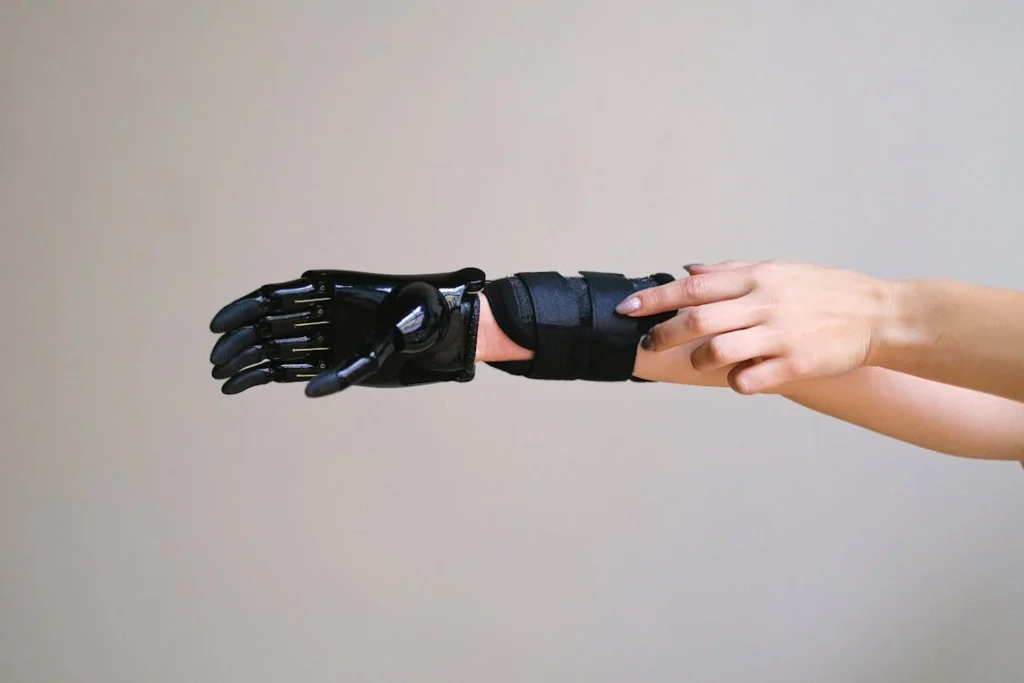Losing a limb is a life-changing experience that affects not only mobility but also overall health. Many people focus on physical recovery, prosthetics, and rehabilitation, but nutrition is just as important. What you eat plays a huge role in healing, energy levels, and even how well your prosthetic fits.
Amputees often face unique nutritional challenges. Their bodies require more energy to move, their muscles must work harder, and their metabolism may change. Poor nutrition can slow healing, cause fatigue, and even lead to problems with prosthetic comfort. The good news? With the right diet, these issues can be managed or even prevented.

Understanding Nutritional Deficiencies in Amputees
After an amputation, the body goes through major changes. The healing process demands more nutrients, metabolism can speed up or slow down, and muscles must compensate for the missing limb.
Without the right nutrition, an amputee may experience slower wound healing, muscle loss, chronic fatigue, and even bone weakness. Understanding why these deficiencies happen is the first step toward fixing them.
Increased Energy Needs and Muscle Loss
Many amputees don’t realize that their bodies require more energy, not less. Even though a limb is missing, the remaining muscles and joints must work harder to maintain balance and movement.
This increases calorie needs, especially for those who are physically active or using a prosthetic regularly. When the body doesn’t get enough energy from food, it starts breaking down muscle tissue for fuel.
This muscle loss can make it harder to use a prosthetic and lead to weakness over time.
Protein is a key nutrient in preventing muscle loss. Without enough of it, the body struggles to rebuild tissue and maintain strength. Many amputees don’t get the protein they need, which can make everyday movements more exhausting.
Lean meats, fish, eggs, dairy, and plant-based options like lentils and chickpeas are great protein sources. Adding more of these to your diet can improve muscle function and boost recovery.
Poor Circulation and Slow Healing
Another common issue amputees face is poor circulation, which can slow down wound healing and increase the risk of infections.
Proper blood flow is essential for delivering oxygen and nutrients to the healing areas, but circulation problems can occur due to reduced physical activity or underlying health conditions like diabetes.
Vitamin C and zinc play a crucial role in healing wounds and keeping the immune system strong. Without enough vitamin C, the body struggles to produce collagen, the protein that helps skin and tissues repair.
Zinc, on the other hand, helps cells grow and recover. Many people don’t get enough of these nutrients, leading to slow healing, frequent infections, and even skin problems around the prosthetic area.
Citrus fruits, bell peppers, and strawberries are great sources of vitamin C, while nuts, seeds, and whole grains provide a healthy dose of zinc. Including these in your meals can speed up healing and prevent complications.
Bone Weakness and Joint Pain
Bone health is another concern for amputees, especially those who use a prosthetic. The extra strain on joints and the remaining limb can lead to pain, discomfort, and even fractures if bones are not strong enough.
Calcium and vitamin D are essential for keeping bones healthy, but many people don’t get enough of them.
Vitamin D helps the body absorb calcium, making it essential for strong bones. Without it, calcium intake won’t be as effective. Sunlight is the best natural source of vitamin D, but it’s also found in fatty fish, eggs, and fortified dairy products.
Calcium-rich foods like milk, yogurt, and leafy greens can help keep bones strong and prevent joint pain.

Common Deficiencies and How to Fix Them
Amputees often experience deficiencies in key vitamins and minerals that are essential for energy, healing, and overall well-being.
These deficiencies don’t just happen overnight; they develop gradually due to poor diet, digestion issues, or increased nutrient needs. Addressing them is crucial for maintaining strength, preventing fatigue, and ensuring that the body functions optimally.
Iron Deficiency and Chronic Fatigue
One of the most common problems among amputees is iron deficiency, which leads to anemia. Iron is essential for carrying oxygen in the blood, and without enough of it, energy levels drop significantly.
Many amputees feel exhausted even after a good night’s sleep, experience dizziness, or notice pale skin—all signs of anemia. This happens because the body may struggle to absorb enough iron, especially if there’s an underlying issue like poor digestion or low protein intake.
Fixing iron deficiency starts with eating the right foods. Red meat, spinach, lentils, and fortified cereals are excellent sources of iron. However, iron from plant-based sources is not absorbed as efficiently as from meat, so pairing these foods with vitamin C-rich options like oranges or tomatoes can help boost absorption.
If iron levels are severely low, a doctor may recommend supplements, but it’s important to take them only under medical supervision, as too much iron can be harmful.
Vitamin B12 Deficiency and Nerve Health
Vitamin B12 is another essential nutrient that many amputees lack. It plays a crucial role in nerve function and red blood cell production. A deficiency can cause numbness, tingling in the limbs, memory problems, and even mood changes like depression or irritability.
Since nerves are already adjusting to the changes after an amputation, any deficiency in B12 can make these symptoms worse.
The best dietary sources of vitamin B12 include eggs, dairy products, fish, and meat. For those following a vegetarian or vegan diet, fortified foods like plant-based milk and cereals can help.
In some cases, B12 supplements or injections may be necessary if absorption is an issue. Regular blood tests can help keep track of levels and ensure the body is getting enough of this important nutrient.
Magnesium Deficiency and Muscle Cramps
Muscle cramps, stiffness, and restless legs are common complaints among amputees, and they are often linked to magnesium deficiency. Magnesium is responsible for muscle relaxation, nerve function, and energy production.
Without enough of it, muscles can feel tight and painful, making movement difficult.
Including magnesium-rich foods like nuts, seeds, bananas, and whole grains in the diet can help reduce these symptoms. Drinking enough water is also essential, as dehydration can make muscle cramps worse.
If magnesium deficiency is severe, a supplement might be needed, but a doctor should always be consulted before taking high doses.
Omega-3 Deficiency and Inflammation
Inflammation is a major issue for amputees, especially those who have residual limb pain or discomfort from prosthetic use. Omega-3 fatty acids help reduce inflammation and improve joint health.
Without enough of these healthy fats, the body may experience more pain, swelling, and stiffness.
Fatty fish like salmon and mackerel, walnuts, flaxseeds, and chia seeds are excellent sources of omega-3s. For those who don’t eat enough of these foods, omega-3 supplements like fish oil or algae-based capsules can help keep inflammation in check.

Practical Steps to Improve Nutrition for Amputees
Understanding nutritional deficiencies is only the first step. The real challenge is making practical changes to your diet and lifestyle that ensure your body gets what it needs every day.
Small adjustments in your meals, hydration, and overall approach to nutrition can make a significant difference in energy levels, healing, and long-term health.
Eating a Balanced Diet Every Day
A well-balanced diet is the foundation of good health. This means including a variety of food groups to ensure that the body gets a steady supply of vitamins, minerals, and essential nutrients.
Protein is one of the most important nutrients for amputees because it supports muscle strength and healing. Including lean meats, fish, eggs, dairy, lentils, and nuts in your meals can help maintain muscle mass and speed up recovery.
Carbohydrates often get a bad reputation, but they are the body’s main source of energy. Whole grains like brown rice, quinoa, and whole wheat bread provide long-lasting energy without causing blood sugar spikes.
Cutting out processed foods and refined sugars can help maintain stable energy levels throughout the day.
Healthy fats are another important part of a balanced diet. Omega-3 fatty acids, found in fish, flaxseeds, and walnuts, help reduce inflammation and keep joints and nerves healthy. Cooking with olive oil instead of processed vegetable oils can also improve overall health.
Fruits and vegetables should be included in every meal. They provide essential vitamins and antioxidants that help the body repair itself and strengthen the immune system.
Leafy greens like spinach and kale are rich in iron and calcium, while brightly colored fruits like oranges and berries provide vitamin C for healing.
Staying Hydrated for Better Circulation
Water is often overlooked when discussing nutrition, but it plays a critical role in circulation, digestion, and muscle function. Many amputees struggle with dehydration, which can lead to fatigue, headaches, and poor blood flow.
Drinking at least 8 to 10 glasses of water per day can help keep the body hydrated and support all its essential functions.
For those who find it difficult to drink plain water, herbal teas, infused water with lemon or cucumber, and coconut water can be good alternatives. Avoiding sugary drinks and excessive caffeine is also important, as these can dehydrate the body rather than nourish it.
Managing Weight to Improve Prosthetic Comfort
Weight management is an important aspect of life for amputees, especially those using a prosthetic limb. Gaining or losing weight can affect the way a prosthetic fits, leading to discomfort, skin irritation, or difficulty walking.
A sudden change in body weight can also impact muscle strength and balance, making mobility harder.
Maintaining a stable weight requires a combination of healthy eating and regular physical activity. Eating mindfully and avoiding overeating is key to preventing unnecessary weight gain.
Portion control and choosing nutrient-dense foods instead of processed snacks can help keep weight stable.
On the other hand, some amputees struggle with unintentional weight loss due to high energy demands.
In this case, eating small but frequent meals rich in healthy fats, proteins, and complex carbohydrates can help maintain a healthy weight. Smoothies with yogurt, nuts, and fruits can be a good option for those who have a reduced appetite.

Overcoming Nutritional Challenges in Daily Life
Adopting a healthier diet sounds simple, but real-life challenges can make it difficult to maintain good nutrition. Many amputees face obstacles such as lack of time, limited access to healthy food, or difficulties in cooking.
However, with the right strategies, it’s possible to make better food choices without completely changing your lifestyle.
Making Healthy Eating Convenient
One of the biggest struggles people face when trying to eat healthier is convenience. Fast food and processed snacks are tempting because they require little effort, but they often lack essential nutrients.
Planning meals in advance can help overcome this challenge. Preparing meals in bulk and storing portions in the fridge or freezer ensures that healthy options are always available.
Simple meals don’t have to be time-consuming. Grilled chicken or fish with vegetables, boiled eggs with whole-grain toast, or a bowl of yogurt with nuts and fruits are quick and nutritious options.
Keeping healthy snacks like nuts, seeds, and dried fruits handy can also prevent unhealthy eating habits.
Dealing with Appetite Changes
Some amputees experience changes in appetite due to medication, reduced physical activity, or stress. A poor appetite can lead to nutritional deficiencies, making recovery and daily activities more challenging.
In such cases, eating smaller, more frequent meals may be helpful. Instead of forcing yourself to eat large portions, spreading meals throughout the day can make it easier to consume enough nutrients.
Smoothies and protein shakes can be a great way to get essential vitamins and minerals when solid foods seem unappealing. Blending fruits, milk, yogurt, nuts, and seeds into a drinkable meal provides calories and nutrients without the effort of chewing a full meal.
Improving Digestion for Better Nutrient Absorption
Even with a good diet, some people struggle with poor nutrient absorption, which can lead to deficiencies. Digestion issues may arise due to a lack of fiber, dehydration, or an imbalance of gut bacteria.
To improve digestion, it’s important to include fiber-rich foods like whole grains, vegetables, and legumes. These help regulate bowel movements and ensure that nutrients are properly absorbed.
Probiotics, found in yogurt and fermented foods like kimchi and pickles, support gut health by promoting good bacteria in the digestive system.
Drinking enough water also aids digestion, preventing constipation and bloating. For those experiencing ongoing digestive problems, consulting a doctor or nutritionist can help identify and address the root cause.
Emotional Eating and Stress Management
Food is often tied to emotions, and many amputees struggle with stress, frustration, or sadness related to their condition. Emotional eating, where food is used for comfort rather than nourishment, can lead to unhealthy eating habits and weight gain.
Recognizing emotional triggers and finding healthier coping mechanisms can prevent these habits from becoming a long-term issue.
Engaging in physical activities, hobbies, or relaxation techniques like meditation can help manage stress without turning to food for comfort.
Talking to a therapist or joining a support group can also provide emotional support and practical advice on dealing with the challenges of life after amputation.

Creating a Sustainable Long-Term Nutrition Plan
Eating well is not just about making short-term changes—it’s about creating a lifestyle that supports long-term health and well-being. Many amputees start with good intentions but find it difficult to maintain healthy habits over time.
The key is to make small, sustainable adjustments that fit into daily life without feeling overwhelming.
Setting Realistic and Achievable Goals
One of the most effective ways to stay on track with nutrition is to set realistic goals. Instead of making drastic changes overnight, focusing on one improvement at a time can make the process easier.
This might mean adding one extra serving of vegetables to meals each day, replacing sugary drinks with water, or making sure to eat enough protein at every meal.
Tracking progress can also be helpful. Keeping a food journal or using a nutrition app can provide insights into eating habits and highlight areas for improvement. However, it’s important not to be too strict—flexibility is key to making long-term changes stick.
Incorporating Physical Activity for Better Health
Exercise plays a crucial role in overall well-being, and it complements a healthy diet. Physical activity helps maintain muscle strength, supports circulation, and even improves mood.
Many amputees worry about exercising with a prosthetic, but with the right guidance, movement can be both safe and enjoyable.
Low-impact exercises such as swimming, yoga, or strength training can help keep the body strong without putting too much stress on the joints. Working with a physical therapist or prosthetist can provide personalized recommendations on the best exercises for individual needs.
Seeking Professional Guidance When Needed
Even with the best intentions, some people may still struggle with nutritional deficiencies, digestive issues, or meal planning. Consulting a dietitian or nutritionist who understands the needs of amputees can provide valuable guidance.
These professionals can help create personalized meal plans, recommend supplements if necessary, and offer strategies to make eating healthy easier.
Regular health check-ups and blood tests can also help identify any ongoing deficiencies before they become serious. Keeping an open line of communication with healthcare providers ensures that any nutritional concerns are addressed early.
Staying Motivated and Building a Support System
Making lifestyle changes is easier when there is a strong support system in place. Family members, friends, or even online communities can offer encouragement, share recipes, and provide motivation to stay on track.
Surrounding yourself with people who support your goals makes it easier to stick with healthy habits.
Finding joy in food and nutrition is also important. Exploring new recipes, trying different types of cuisine, or growing your own vegetables can make healthy eating more enjoyable.
The goal is not to follow a strict diet but to develop a way of eating that feels natural and sustainable for life.

The Connection Between Nutrition and Phantom Limb Pain
One unique challenge many amputees face is phantom limb pain, a sensation that feels like discomfort, tingling, or even severe pain in the missing limb.
While the exact cause is still being studied, research suggests that nerve damage, brain adaptation, and inflammation all play a role. What many people don’t realize is that nutrition can influence the intensity and frequency of phantom limb pain.
How Inflammation Affects Nerve Pain
Chronic inflammation in the body can make nerve pain worse, and certain foods contribute to inflammation. Processed foods high in sugar, unhealthy fats, and artificial additives can trigger inflammatory responses that may worsen phantom pain.
On the other hand, anti-inflammatory foods can help calm the nervous system and reduce discomfort.
Fatty fish like salmon and sardines, along with flaxseeds and walnuts, provide omega-3 fatty acids, which are known to reduce inflammation.
Turmeric, a common spice, contains curcumin, which has powerful pain-relieving properties when paired with black pepper for better absorption. Leafy greens, berries, and nuts also contain antioxidants that help protect nerves from damage.
The Role of Magnesium in Nerve Relaxation
Magnesium plays a crucial role in nerve function and muscle relaxation. A deficiency in magnesium can lead to increased nerve excitability, which might make phantom limb pain feel worse.
Many people don’t get enough magnesium from their diet, especially those who consume a lot of processed foods.
Good sources of magnesium include dark chocolate, bananas, almonds, pumpkin seeds, and whole grains. Drinking enough water is also important, as dehydration can contribute to muscle tightness and nerve irritation.
Blood Sugar Control and Pain Sensitivity
Blood sugar fluctuations can also impact nerve sensitivity. When blood sugar levels spike and drop frequently, it can lead to increased nerve pain and discomfort.
Amputees with diabetes are especially at risk, but even those without diabetes can benefit from stable blood sugar levels.
Eating balanced meals with complex carbohydrates, like quinoa and oats, along with fiber-rich vegetables and healthy proteins, can help prevent blood sugar crashes that contribute to nerve pain. A
voiding excessive sugar and refined carbohydrates can also lead to more consistent energy levels and less inflammation.
Hydration and Electrolyte Balance
Dehydration can make nerves more sensitive, increasing the likelihood of phantom limb pain. When the body lacks enough fluids, electrolyte imbalances can occur, affecting nerve signaling.
Drinking enough water, herbal teas, and electrolyte-rich drinks like coconut water can help keep nerves functioning properly and reduce painful sensations.
Conclusion
Good nutrition is essential for amputees to maintain strength, heal properly, and feel their best. While nutritional deficiencies are common, they can be corrected with the right dietary choices, hydration, and lifestyle adjustments. By focusing on balanced meals, improving digestion, staying active, and seeking support when needed, amputees can take control of their health and well-being.
If you or someone you know is struggling with prosthetic comfort, muscle weakness, or fatigue, nutrition may be the missing piece. At Robobionics, we are committed to helping amputees not just with advanced prosthetics but with holistic well-being. Looking for more ways to improve your prosthetic experience? Contact us today to learn more about our innovative solutions and rehabilitation programs!



